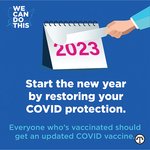

by the We Can Do This COVID-19
Public Education Campaign
(NAPSI)—Many people celebrate the promise and new beginnings of the New Year by making resolutions—often focused on health goals like losing weight, eating healthier, and working out. Getting healthy through small actions—baby steps—can be a sustainable way to make changes for a healthy new year. Feeling and seeing a small positive change can encourage you to make more changes.
Consider the following baby steps to help make 2023 your best year yet:
•Sleep. Sleep is a necessity, not a luxury. Aim to get at least seven hours of sleep each night. Failing to get enough sleep is linked with many chronic health conditions.
•Move more, sit less. Plan to add short walks and other activities that you like that get you moving. Strive for at least 150 minutes of moderate aerobic activity per week. If 150 minutes is too much at first, slowly add a fun and easy movement each day until you can walk, dance, or do yard work for 30 minutes a day for five days a week.
•Drink wisely. Substitute water or unsweetened tea for sugary drinks to reduce your daily caloric intake. If you are used to consuming a lot of sweet beverages, try swapping out one drink per day and see how you feel.
•Relax. Make time to unwind and connect with others. Taking deep breaths and meditating can go a long way to relieving stress, which in turn can help lower blood pressure. Connecting with others and talking to people you trust about how you feel, or what makes you grateful, can have the same effect.
•Think prevention. Stay current on vaccinations, including for COVID-19. Getting sick with COVID or other preventable illnesses can derail your other healthy habits, especially if you develop long COVID, which may be more likely in people who are not vaccinated. Getting vaccinated or getting an updated vaccine if you’ve already completed a primary series is an easy way to prevent the worst outcomes from COVID and keep you on track for a healthy year.
“While COVID remains a serious healthcare issue going into 2023, COVID care has made tremendous development,” said Antrell Tyson, Esq., Regional Director for the U.S. Dept. of Health & Human Services. “It is vitally important that each of us stay up-to-date with available vaccines to maintain the protection of earlier doses because COVID is treatable and serious illness can be avoided.”
COVID vaccines are widely available and free. Vaccines are available at no cost to anyone age 6 months or older living in the United States, no matter their immigration or health insurance status.
For more information and to find a vaccine near you, visit vaccines.gov.